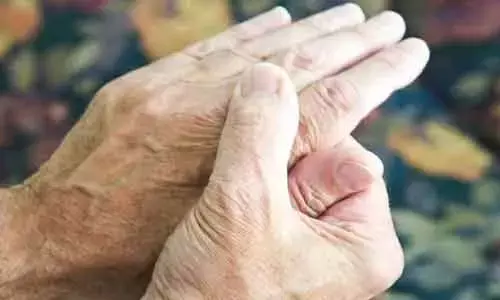- Home
- Medical news & Guidelines
- Anesthesiology
- Cardiology and CTVS
- Critical Care
- Dentistry
- Dermatology
- Diabetes and Endocrinology
- ENT
- Gastroenterology
- Medicine
- Nephrology
- Neurology
- Obstretics-Gynaecology
- Oncology
- Ophthalmology
- Orthopaedics
- Pediatrics-Neonatology
- Psychiatry
- Pulmonology
- Radiology
- Surgery
- Urology
- Laboratory Medicine
- Diet
- Nursing
- Paramedical
- Physiotherapy
- Health news
- Fact Check
- Bone Health Fact Check
- Brain Health Fact Check
- Cancer Related Fact Check
- Child Care Fact Check
- Dental and oral health fact check
- Diabetes and metabolic health fact check
- Diet and Nutrition Fact Check
- Eye and ENT Care Fact Check
- Fitness fact check
- Gut health fact check
- Heart health fact check
- Kidney health fact check
- Medical education fact check
- Men's health fact check
- Respiratory fact check
- Skin and hair care fact check
- Vaccine and Immunization fact check
- Women's health fact check
- AYUSH
- State News
- Andaman and Nicobar Islands
- Andhra Pradesh
- Arunachal Pradesh
- Assam
- Bihar
- Chandigarh
- Chattisgarh
- Dadra and Nagar Haveli
- Daman and Diu
- Delhi
- Goa
- Gujarat
- Haryana
- Himachal Pradesh
- Jammu & Kashmir
- Jharkhand
- Karnataka
- Kerala
- Ladakh
- Lakshadweep
- Madhya Pradesh
- Maharashtra
- Manipur
- Meghalaya
- Mizoram
- Nagaland
- Odisha
- Puducherry
- Punjab
- Rajasthan
- Sikkim
- Tamil Nadu
- Telangana
- Tripura
- Uttar Pradesh
- Uttrakhand
- West Bengal
- Medical Education
- Industry
Use of ultrasound of no benefit for treat-to-target therapy in rheumatoid arthritis

Oslo, Norway: Systematic use of ultrasound does not provide a benefit in the follow-up of patients with early rheumatoid arthritis (RA), finds a recent study published in the journal Rheumatology.
According to the study, compared with a conventional treatment strategy incorporation of ultrasound information in treatment decisions does not lead to reduced magnetic resonance imaging (MRI) inflammation or less structural damage.
Rheumatoid arthritis is a common autoimmune disorder causing painful inflammation and damage to the joints of affected patients. The objective of RA care today is to treat patients to clinical remission, but these patients may still have subclinical inflammation visible on ultrasound or magnetic resonance imaging.
Ulf Sundin, University of Oslo, Oslo, Norway, and colleagues investigated whether an ultrasound-guided treat-to-target strategy for early RA would lead to reduced MRI inflammation or less structural damage progression compared with a conventional treat-to-target strategy.
For the purpose, a total of 230 DMARD-naïve early RA patients were randomized to an ultrasound tight control strategy targeting DAS <1.6, no swollen joints and no power Doppler signal in any joint or a conventional strategy targeting DAS <1.6 and no swollen joints. The patients were treated according to the same escalation strategy.
MRI of the dominant hand was performed at six-time points over 2 years and scored according to the OMERACT RA MRI scoring system. A total of 218 patients had baseline and one or more follow-up MRIs and were included in the analysis. The mean MRI score change from baseline to each follow-up and the 2-year risk for erosive progression were compared between arms.
Key findings of the study include:
- MRI bone marrow oedema, synovitis and tenosynovitis improved over the first year and was sustained during the second year of follow-up, with no statistically significant differences between the ultrasound and the conventional arms at any time point.
- The 2 year risk for progression of MRI erosions was similar in both treatment arms: ultrasound arm 39%, conventional arm 33% [relative risk 1.16].
"The MRI results, with no trend towards less joint damage progression in the ultrasound arm, support the conclusions of the primary outcomes of the above-mentioned trials—that an ultrasound-guided strategy does not lead to improved treatment outcomes," wrote the authors.
"Our findings support the current treatment recommendations for early RA," they concluded.
The study, "Conventional versus ultrasound treat to target: no difference in magnetic resonance imaging inflammation or joint damage over 2 years in early rheumatoid arthritis," is published in the journal Rheumatology.
Dr Kamal Kant Kohli-MBBS, DTCD- a chest specialist with more than 30 years of practice and a flair for writing clinical articles, Dr Kamal Kant Kohli joined Medical Dialogues as a Chief Editor of Medical News. Besides writing articles, as an editor, he proofreads and verifies all the medical content published on Medical Dialogues including those coming from journals, studies,medical conferences,guidelines etc. Email: drkohli@medicaldialogues.in. Contact no. 011-43720751


